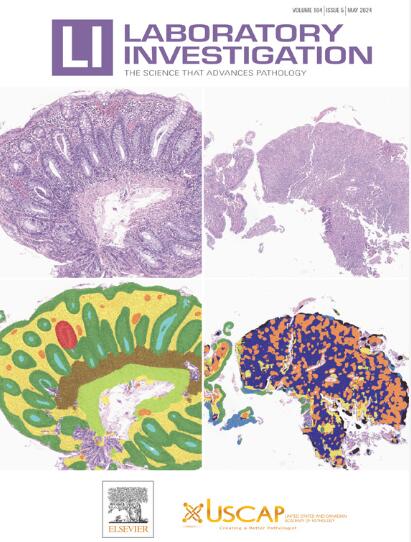帕金森病树鼩模型:替代非人灵长类动物模型的经济有效的方法。
IF 5.1
2区 医学
Q1 MEDICINE, RESEARCH & EXPERIMENTAL
引用次数: 0
摘要
对实验猴的需求激增导致其成本迅速增加。因此,人们越来越需要一种能表现出所有核心临床和病理表型的帕金森病(PD)低成本高效益模型。与啮齿类动物相比,树鼩(Tupaia belangeri)在进化过程中更接近灵长类动物,因此可能是建立帕金森病模型的理想物种。为了建立树鼩帕金森病模型,我们使用了1-甲基-4-苯基吡啶鎓(MPP+)(一种来自1-甲基-4-苯基-1,2,3,6-四氢吡啶(MPTP)的代谢物)来诱导单侧黑质多巴胺能神经元的病变。诱导的树鼩模型在5个月的时间里持续表现出并维持了所有典型的帕金森病临床表现。症状包括运动迟缓、静止性震颤、姿势不稳,约50%的个体表现出阿朴吗啡诱导的旋转,这是单侧帕金森病模型的典型表型。所有这些都与在帕金森病猴身上观察到的症状非常相似。同时,该模型对左旋多巴治疗也很敏感,且呈剂量依赖性,这表明运动障碍与多巴胺有关。免疫染色显示,病变的黑质中多巴胺能神经元显著减少(约95%),而多巴胺能神经元是帕金森病的重要病理标志。此外,注射生理盐水的黑质对照组未出现任何运动障碍和病理变化。细胞形态学分析表明,树鼩黑质多巴胺能神经元的大小远大于啮齿类动物,与猕猴接近。形态学上的相似性可能是猴和树鼩帕金森病模型表现出高度相似表型的重要结构基础。总之,在这项研究中,我们成功地在小动物物种中建立了一个帕金森病模型,该模型忠实地再现了帕金森病猴的典型临床症状和关键病理指标,为帕金森病治疗方法和潜在机制的评估提供了一个新颖和低成本的途径。本文章由计算机程序翻译,如有差异,请以英文原文为准。
The Tree Shrew Model of Parkinson Disease: A Cost-Effective Alternative to Nonhuman Primate Models
The surge in demand for experimental monkeys has led to a rapid increase in their costs. Consequently, there is a growing need for a cost-effective model of Parkinson disease (PD) that exhibits all core clinical and pathologic phenotypes. Evolutionarily, tree shrews (Tupaia belangeri) are closer to primates in comparison with rodents and could be an ideal species for modeling PD. To develop a tree shrew PD model, we used the 1-methyl-4-phenylpyridinium (MPP+), a metabolite derived from 1-methyl-4-phenyl-1,2,3,6-tetrahydropyridine, to induce lesions in dopaminergic neurons of the unilateral substantia nigra. The induced tree shrew model consistently exhibited and maintained all classic clinical manifestations of PD for a 5-month period. The symptoms included bradykinesia, rest tremor, and postural instability, and ∼50% individuals showed apomorphine-induced rotations, a classic phenotype of unilateral PD models. All these are closely resembled the ones observed in PD monkeys. Meanwhile, this model was also sensitive to L-dopa treatment in a dose-dependent manner, which suggested that the motor deficits are dopamine dependent. Immunostaining showed a significant loss of dopaminergic neurons (∼95%) in the lesioned substantia nigra, which is a crucial PD pathological marker. Moreover, a control group of nigral saline injection did not show any motor deficits and pathological changes. Cytomorphologic analysis revealed that the size of nigral dopaminergic neurons in tree shrews is much bigger than that of rodents and is close to that of macaques. The morphologic similarity may be an important structural basis for the manifestation of the highly similar phenotypes between monkey and tree shrew PD models. Collectively, in this study, we have successfully developed a PD model in a small animal species that faithfully recapitulated the classic clinical symptoms and key pathological indicators of PD monkeys, providing a novel and low-cost avenue for evaluation of PD treatments and underlying mechanisms.
求助全文
通过发布文献求助,成功后即可免费获取论文全文。
去求助
来源期刊

Laboratory Investigation
医学-病理学
CiteScore
8.30
自引率
0.00%
发文量
125
审稿时长
2 months
期刊介绍:
Laboratory Investigation is an international journal owned by the United States and Canadian Academy of Pathology. Laboratory Investigation offers prompt publication of high-quality original research in all biomedical disciplines relating to the understanding of human disease and the application of new methods to the diagnosis of disease. Both human and experimental studies are welcome.
 求助内容:
求助内容: 应助结果提醒方式:
应助结果提醒方式:


